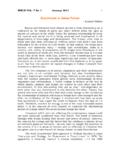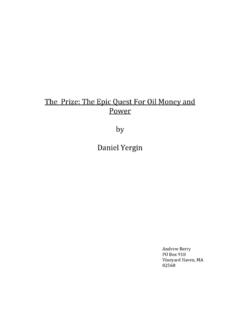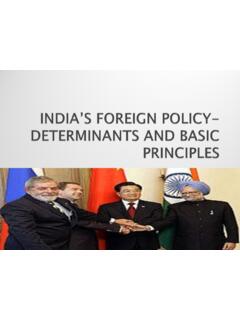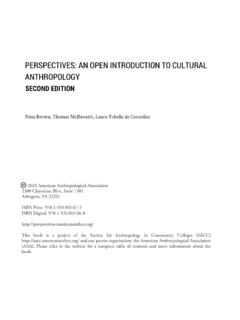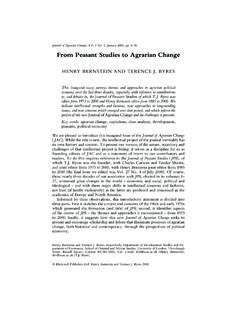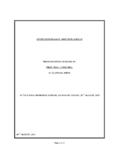Transcription of Arundati Rai’s The God of Small Things – A Post- Colonial ...
1 IRWLE VOL. 7 No. 2 July 2011 1 Arundati Rai s The God of Small Things A post - Colonial reading Rajeev. G The adjective post Colonial signifies the notion that the novel or be it any piece of writing for that matter, goes beyond every possible parameters of the locality, region and nation to participate in the global scenario today which is an aftermath of European colonization. The God of Small Things written in the post Colonial Anglophone by Arundhati Roy does reveal a decisive post Colonial condition; through its dialogues, characters and various events and instances it encompass. Ms Roy refers to the metaphor the heart of darkness in the novel which is a sort of ridiculous reference to Conrad s novel the heart of darkness. She says that, in Ayemenem, in the heart of darkness, I talk not about the White man, but about the Darkness, about what the Darkness is about. (Frontline, August 8, 1997). The God of Small Things tells the story of one family in the town of Ayemenem in Kerala, India.
2 The temporal setting shifts back and forth from 1969, when Rahel and Estha, a set of fraternal twins are 7 years old, to 1993, when the twins are reunited at age 31. The novel begins with Rahel returning to her childhood home in Ayemenem, India, to see her twin brother Estha, who has been sent to Ayemenem by their father. Events flash back to Rahel and Estha s birth and the period before their mother Ammu divorced their father. Then the narrator describes the funeral of Sophie Mol, Rahel and Estha s cousin, and the point after the funeral when Ammu went to the police station to say that a terrible mistake had been made. Two weeks after this point, Estha was returned to his father. The narrator briefly describes the twins adult lives before they return to Ayemenem. In the present, Baby Kochamma gloats that Estha does not speak to Rahel just as he does not speak to anyone else, and then the narrator gives an overview of Baby Kochamma s life. Rahel looks out the window at the building that used to contain the family business, Paradise Pickles and Preserves, and flashes back to the circumstances surrounding Sophie Mol s death.
3 Through flashbacks Roy is telling a story about what happened in the family when Estha and Rahel were young. Horrible memories are revealed, like the smarmy soda salesman selling yellow, sweet sodas; Sophie Mol's death; and the forbidden love with an untouchable. IRWLE VOL. 7 No. 2 July 2011 2 In Black Skin, White Masks , Fanon (psychiatrist, philosopher, revolutionary, and a major post Colonial author) suggests that colonialism, with its explicit conceptual under-pinnings of white racial superiority over non-white peoples, has created a sense of division and alienation in the self-identity of the non-white colonized people. The history, culture, language, customs and beliefs of the white colonizers are imposed on the colonized and they are eventually coaxed to consider them as universal, normative and superior to their own local indigenous culture. This creates a strong sense of inferiority in the colonized subject and leads to an adoption of the language, culture and customs of the colonizers by the colonized as a way of compensating for these feelings of inferiority in their self-identity.
4 This creates a divided sense of self in the subject formation of the colonized. Through this study I intend to do a post Colonial analysis of the novel. post colonialism , the term itself is in want of a cohesive definition. It contains within it historical and geographical notions. All post Colonial experiences are nearly the same regardless of history. To conquer, to subjugate, to occupy and to dominate another being are all intrinsic Colonial stops. This discussion has also been formulated against issues like identity, hybridity, cultural differences and conflict. Roy s novel, even though complex, incoherent and fragmented, conveys a deeper meaning that runs into notions regarding human perspectives, values and attitudes of a post Colonial nation. The relation between India and English has been a long and troublesome one. In India, the cultural impact of imperialism dominated the urban elite class and the semi- westernized upper and lower middle classes.
5 The women writers of post Colonial India too hail from either elite or moderate backgrounds and their writings reflected their experiences. Here, Arundhati Roy, we see her capitalize on her straddling of different cultures as an Indian writer writing in English by making this a crucial element in the identities of her major protagonists. The twins portrayed in the novel are often found speaking Malayalam and English. Their world itself is plotted by a whole range of western references. Rahel expresses her love for her mother Ammu by quoting Kipling s Jungle Book: We be of one blood, ye and I (Pg no 329). We also find that Estha is an ardent fan of Elvis Presley. These can be traced as instances of self- betrayal. They identify themselves with Things and people which are alien to them. It is like forging a new identity; a new English identity. Their uncle Chacko quotes verbatim from the Great Gatsby, the story of another oxford man (pg no 38).
6 There are instances in the novel where the children are deliberately pushed into an anglicized mode of thought and living. Awareness of English language was given more priority and the parents and guardians always took care of the fact that IRWLE VOL. 7 No. 2 July 2011 3 their children, nieces or nephews excelled in the language of the Angle-land. Uncle Chacko describes a war scene in which he uses the word despise (pg 53) which was a difficult word and Estha and Rahel were made to look it up in the dictionary for the apt meaning. Another instance in the novel in which Ammu says that Pappachi was incurable British and in Hindi it meant shit wiper. Chacko said that the correct word for people like Pappachi was anglophile. He made Estha and Rahel look up anglophile in the Reader s Digest Great Encyclopedic Dictionary (pg 52). When Sophie Mol, Rahel and Estha s cousin comes down from London, Mammachi (their grandmother) is extremely apprehensive about her grandchildren s ability to speak English fluently.
7 She surreptitiously listens to the twins speaking and punished them if they spoke in Malayalam or if they made mistakes while speaking in English. Such an ardent obsession with the imperial language and codes is typical of a post Colonial community, where an involuntary subservience to the imperial hordes and an ingrained devotion to their modes and customs typify their psyche. Sophie Mol, their English cousin was presented to them as ideal. She is constantly compared to Rahel and Estha, leaving them depressed and embittered. Sophie Mol is loved from the beginning even before she arrives and when she died the loss of Sophie Mol became more important than her memory. (pg 186). Hybridity occurs in post Colonial societies both as a result of conscious movements of cultural suppression, as when the Colonial power invades to consolidate political and economic control, or when settler-invaders disposes indigenous peoples and force them to assimilate to new social patterns.
8 It may also occur in later periods when patterns of immigration from metropolitan societies and from other imperial areas of influence [..] continue to produce complex cultural palimpsests with the post Colonial world. Frantz Fanon talks about such a divided sense of the self in his Black Skin, White Masks . He says As I begin to recognize that the Negro is the symbol of sin, I catch myself hating the Negro. But then I recognize that I am a Negro. There are two ways out of this conflict. Either I ask others to pay no attention to my skin, or else I want them to be aware of it. Skin colour and race are seen to create a very different sort of power structure. A white skin is an ideal of beauty which leaves anyone with dark skin in a lower bracket. The impression that Sophie Mol leaves for herself is, hatted, bell bottomed and loved from the beginning (pg 186). This out of the bounds glorification of the west is peculiar of the entire family s behavior especially in Baby Kochamma s.
9 The sense of inferiority complex at being Indian makes her speak with an artificial accent and ask Sophie Mol questions on Shakespeare s Tempest . All this was of course primarily to announce her credentials to Margaret Kochamma (Chacko s English wife). To set herself apart from the IRWLE VOL. 7 No. 2 July 2011 4 Sweeper class (pg 144). The spread of English throughout the globe via colonialism trade and commerce has resulted in the emergence of a number of accomplished writers today including Roy who is a representative of such a cultural blend that looms large over the whole world. In The God of Small Things Roy strikes a phrase led out of the history house which connotes different levels of meaning other than the peripheral one. It means that we are people who are forced into an anglicized pattern of thinking and practice which is enabled by the public school education established by the Colonial rulers.
10 Roy herself is a representative of such a phenomenon. As Chacko exclaims in the novel we are the prisoners of war. Our dreams have been doctored. We belong nowhere. We sail unanchored on troubled seas. We may never be allowed ashore. Our sorrows will never be sad enough, our joys never happy enough, our dreams never big enough, our lives never important enough to matter (pg 53). It is quite true to say so. The post Colonial mind is a fragmented Post- war ground; a war that s won and lost. Edward Said (Palestinian American literary theorist, cultural critic) argues that the West had dominated the East for more than 2,000 years, since the composition of The Persians by Aeschylus. Europe had dominated Asia politically so completely for so long that even the most outwardly objective Western texts on the East were permeated with a bias that even most Western scholars could not recognize. His contention was not only that the West has conquered the East politically but also that Western scholars have appropriated the exploration and interpretation of the Orient s languages, history and culture for themselves.
